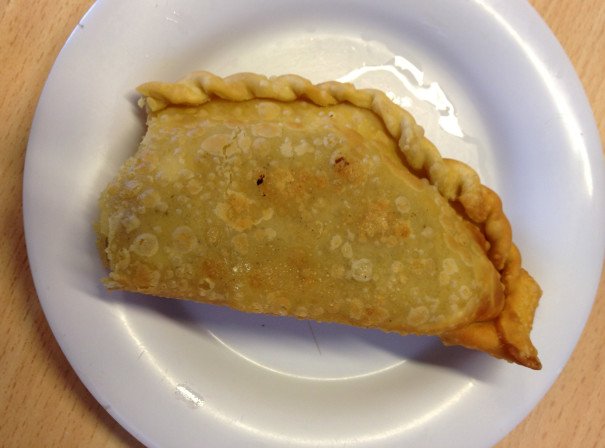
Troubled Histories and Runny Cheese Grease Will Get You Every Time

Troubled Histories and Runny Cheese Grease Will Get You Every Time
Empanadas de Jaiba in Pisagua
In Pisagua, a decaying coastal village in Chile’s Atacama desert, an empanada is not a baked chicken- or beef-filled affair. It’s deep-fried, filled with melted cheese and prawns, fish, abalone, or—my favorite—jaiba: crab meat. It’s great for breakfast, but also lunch, tea, or supper, even better washed down with a glass of chilled white. Over two days ventured to Monica’s repeatedly to find these empanadas. The place isn’t actually called Monica’s, but everyone here is on a first-name basis, though this familiarity never quite crosses the line into camaraderie.
“Pisagua debe ser puerto,” reads a weathered banner hanging from a gutted building on the main street. Pisagua should be a port. It seems ambitious, considering there’s only one wharf and you can easily count the number of wooden boats in the bay. It’s an exhortation to reclaim Pisagua’s glory days, still evidenced by the neoclassical relics built of Oregon pine—watchtower, theatre, fire station, prison, railway terminus, hospital, church—dating from the late 19th-century nitrate-mining boom. They give Pisagua the ghostly beauty of an abandoned film set and are the reason for the odd tourist appearance here.
Pisagua had been one of Chile’s most important port cities, but lost its relevance with the Depression and development of synthetic nitrogen; later, the peculiarities of its geography, though a boon before, soon became a curse. Wedged between hulking cliffs and the sea—like a “natural prison,” it’s often said—Pisagua was used as a camp for political prisoners, most infamously in the 1970s under Pinochet’s military dictatorship. A glimpse of the horrors that went on can be seen in a gaping rectangular pit in the sand near the cemetery, which had been a secret mass grave containing nineteen bodies of suspected “communists” and is now a memorial.
Pisagua has never really recovered. It has struggled to find an alternative economy, such as fishmeal production and abalone fishing, but they were ultimately unsustainable. Later, there were initiatives to encourage tourism on the back of its history and natural beauty, which also hasn’t panned out.
These days, most of Pisagua’s inhabitants are subsistence fishermen, harvesting shellfish and algae. You won’t see fresh catches of the day being advertised here. Still, something about the empanada de jaiba’s briny tang could jazz me to life with just one bite, before or during a day’s hike along the sun-beaten ridges and secluded beaches extending out like outstretched arms from the bay. The only problem was, I never quite mastered the art of eating it without staining the front of my shirt. That runny cheese grease will get you every time.